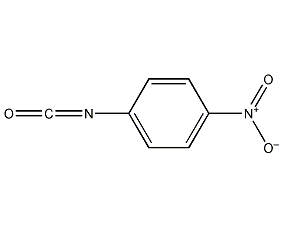p-nitrophenyl isocyanate p-nitrophenyl isocyanate


Structural formula
| Business number | 02HL |
|---|---|
| Molecular formula | C7H4N2O3 |
| Molecular weight | 164 |
| label |
4-nitrobenzene isocyanate, p-Nitrophenyl isocyanate, p-Nitrophenyl isocyanate, p-nitrobenzene isocyanate, 4-Nitrophenyl isocyanate, P-Nitrophenyl isocyanate, Timtec-bb sbb006628, 1-Isocyanato-4-nitro-benzenester, Aromatic nitrogen-containing compounds and their derivatives |
Numbering system
CAS number:100-28-7
MDL number:MFCD00007306
EINECS number:202-836-3
RTECS number:DA3692500
BRN number:389516
PubChem number:24850685
Physical property data
1. Properties: bright yellow needle-like crystals.
2. Density (g/mL, 20℃): Undetermined
3. Relative vapor density (g/mL, air=1): Undetermined
4. Melting point (ºC): 56-59
5. Boiling point (ºC, normal pressure): Undetermined
6. Boiling point (ºC, 11mmHg): 137-138
7. Refractive index: Undetermined
8. Flash point (ºC): >110
9. Specific rotation (º): Undetermined
10. Autoignition point or ignition temperature (ºC): Not determined
11. Vapor pressure (mmHg, 20ºC): Not determined
12. Saturated vapor Pressure (kPa, 137-138ºC): 1.47
13. Heat of combustion (KJ/mol): Undetermined
14. Critical temperature (ºC): Undetermined
15. Critical pressure (KPa): Undetermined
16. Log value of oil-water (octanol/water) partition coefficient: Undetermined
17. Explosion upper limit (% , V/V): Undetermined
18. Lower explosion limit (%, V/V): Undetermined
19. Solubility: Easily soluble in ether and benzene.
Toxicological data
Acute toxicity: Rat oral LD50: 1600mg/kg; Rat peritoneal cavity LD50: 100mg/kg; Guinea pig skin contact LD50: 10mL/kg;
Ecological data
This substance is harmful to the environment, and special attention should be paid to the pollution of water bodies.
Molecular structure data
1. Molar refractive index: 41.81
2. Molar volume (cm3/mol): 124.0
3. Isotonic specific volume (90.2K ): 340.7
4��� Surface tension (dyne/cm): 56.9
5. Dielectric constant:
6. Dipole moment (10-24cm3):
7. Polarizability: 16.57
Compute chemical data
1. Reference value for hydrophobic parameter calculation (XlogP): None
2. Number of hydrogen bond donors: 0
3. Number of hydrogen bond acceptors: 4
4. Number of rotatable chemical bonds: 1
5. Number of tautomers: none
6. Topological molecule polar surface area 75.2
7. Number of heavy atoms: 12
8. Surface charge: 0
9. Complexity: 209
10. Number of isotope atoms: 0
11. Determine the number of atomic stereocenters: 0
12. Uncertain number of atomic stereocenters: 0
13. Determine the number of chemical bond stereocenters: 0
14. Number of uncertain chemical bond stereocenters: 0
15. Number of covalent bond units: 1
Properties and stability
Toxic. Can burn when exposed to open fire. It decomposes when exposed to moisture, water or water vapor and releases toxic gases.
Storage method
It can decompose when exposed to moisture. Avoid contact with strong oxidants, strong acids, and strong alkali.
Plastic drum with net weight of 50kg, heat-proof and moisture-proof, stored in a cool and ventilated warehouse. Keep away from fire and heat sources. Store and transport separately from acids, oxidants, and edible raw materials
Synthesis method
The preparation method is to use p-nitroaniline as raw material, first form hydrochloride with hydrogen chloride, and then add phosgene to form the product.

Purpose
Reagents for the determination of alcohols, primary amines, secondary amines and amino acids. Used to synthesize medicines, pesticides and polymer materials
